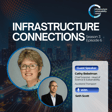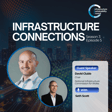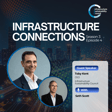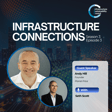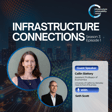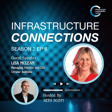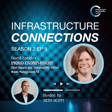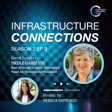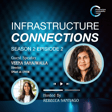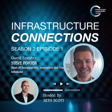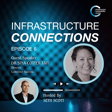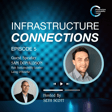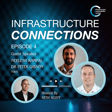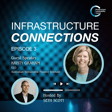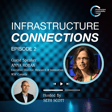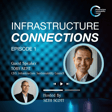Become a Creator today!Start creating today - Share your story with the world!
Start for free
00:00:00
00:00:01

S2E4 - Regenerate Nature w/ Georgine Roodenrys
Guest Speaker Georgine Roodenrys is a respected leader in regenerative industrial development, with deep expertise in decarbonisation, circular economy, and climate strategy. She is a Director at Rennie, where she advises clients on navigating the complex transition to a low-carbon economy, integrating sustainability, innovation, and human progress.
👉 We'd love to hear your feedback, share your questions or comments below.
👉 Like & Subscribe so you won't miss out on our upcoming episodes!
👉 Keep up to date with the Infrastructure Sustainability Council: Website: https://www.iscouncil.org/ LinkedIn: / infrastructure-sustainability-council
#podcast #infrastructure #sustainability #buildingtomorrow
Transcript
Introduction to Regenerative Nature and Sustainability
00:00:00
Speaker
regenerating nature becomes very much this concept of how do we start to look at the underlying natural system ah because our lives depend on it.
00:00:16
Speaker
Hi, and welcome again to another episode of Infrastructure Connections, the podcast where we explore what makes sustainable infrastructure work. Brought to you by the Infrastructure Sustainability Council.
Georgine Rudin-Rees: Career and Inspirations
00:00:29
Speaker
I'm your host, Rebecca Santiago, and today we'll be speaking about regenerative nature with Georgine Rudin-Rees.
00:00:37
Speaker
Georgine is a respected leader in regenerative industrial development with deep expertise in climate strategy circular economy, and decarbonization.
00:00:49
Speaker
Georgine is a director at Rini, where she advises clients on navigating that complex transition to a low-carbon economy by integrating innovation, sustainability, and human progress.
00:01:03
Speaker
Her work spans emerging green technologies, such as hydrogen and low carbon fuels. And she also drives systemic change through the design and delivery of transformative climate and sustainability initiatives.
00:01:21
Speaker
Georgine, thank you so much for joining us. It's a pleasure to have you today. Welcome to the show. Thanks so much, Rebecca. um Really great topic. So look forward to look forward to the discussion.
00:01:34
Speaker
Thank you. And before we jump in into today's topic, regenerate nature, let's start from your journey. So what sparked your interest in sustainability? Yeah, thanks, Rebecca. Look, it's been a lifelong journey for me.
00:01:48
Speaker
um i was really lucky to have been inspired by my grandparents. um They established something called the Burundong Arboretum, which is in New South Wales. um It was developed in the 60s, but from an idea in the 30s from my great-uncle George.
00:02:02
Speaker
um And it was fairly radical at the time. It was to take a whole pile of sheep grazing land and to restore that to nature, um and to make it a place for the, i guess, protection of native Australian species.
00:02:15
Speaker
um The Barrandong Arboretum is still there um and at its sort of peak, it was the third largest arboretum in the world and it's it's ah it's a beautiful place and one I can recommend that people visit.
00:02:26
Speaker
But it's very much shaped my career and my studies um and so I'm really grateful for that inspiration. Beautiful. It's always really inspiring and also so interesting to hear where people's sustainability journey started.
Circular Economy in Queensland
00:02:40
Speaker
um Okay, so now let's zoom in into one of your early leadership roles.
00:02:45
Speaker
So that was the Secular Economy Strategy um in Queensland. You were very involved. Can you tell us more about it?
00:02:57
Speaker
Yeah, look, um we you know i i was very, very privileged to lead the climate team in in Queensland during during um the last ah Labor government and it was a really, really interesting time.
00:03:10
Speaker
um we were working very much on making um sort of climate change a key economic issue for the states. um And, you know, that that sort of logic and thinking as as we did whole of economy, um sort of climate change work um was sort of deeply embedded.
00:03:27
Speaker
And inevitably, when you start to look at some of your key um sectors, particularly around built environment, um you really start to think about sort of circular economy, circular economy principles.
00:03:41
Speaker
um what we desperately were trying to do was ensure that circular economy just wasn't tagged um to the waste agenda entirely um and to really sort of, because it was so fundamental to our ability to to deliver on our climate change goals.
00:03:55
Speaker
um And if you take the Ellen MacArthur Foundation perspective, you know, 45% of emissions of any economy are the inputs sort of within that economy, um which, you know, only really circular economy um strategies can resolve. So it was it was fairly vital.
00:04:11
Speaker
and But look, there's you know some of the question is around the systems thinking, I guess, that we need for circular economy. um and And that's really sort of challenging in government.
00:04:28
Speaker
um In theory, you've got all of the ingredients for governments to be extraordinary in terms of of of systems thinking. ah Simply because they've got every aspect, you know, whether it's sort of the societal or the environmental or the economic, they have expertise in all of those areas.
00:04:45
Speaker
But, you know, sort of you really get killed like everywhere in terms of the ability to think within a a long-term perspective. um that they The immediate problems are so demanding. Everyone is so reactive um There's very little space for people to step above that to do the long term or think to a different horizon and start to think about how we get ahead of issues rather than just keep repeating the same old, you know.
00:05:11
Speaker
um So it's ah it's an interesting place. um That said, I think, you know, government has huge potential to to be extraordinary in leading sort of circular thinking throughout the the portfolio of government,
00:05:26
Speaker
um you know, by taking a scenario sort of planning view in terms of, you know, where is it we want to be as a society? What do we want our environment to look like? You know, by 2050, what do we socially um ah strive to look like?
00:05:41
Speaker
um And really setting ah goals that are broader than um just the economic um sort of targets that we have for ourselves. And then if we then cross-fertilise those targets so that every agency is responsible on delivering sort of environmental, social, economic outcomes, you would start to get that better integration of of thinking and the ability to start integrating um things like circular economy principles and um So it's ah an interesting place, um challenging, um but, you know, I think, you know, all of these um states are doing such good work in leaning into these adoption of things like um ah circular economy, as well as sort of deep um climate change ah programs that are are really shifting the dial.
00:06:34
Speaker
Yeah, thank you. Thank you for sharing that. And that highlights how we've been rethinking systems, looking at how materials, resources, and industries are now interacting to reduce waste.
00:06:48
Speaker
But now we're seeing a shift on how that's taken a further step, and that's where regeneration comes in.
Regenerative Nature vs. Regenerative Economy
00:06:59
Speaker
Yeah. How would you define regenerate nature?
00:07:05
Speaker
Yeah, so look, I've been doing a bit in... um you know regenerate You know, the regeneration of of nature. I've also done a lot of thinking around regenerative economy, um very different concepts.
00:07:21
Speaker
um So, you know, if listeners are thinking, oh, is that the same as regenerative economy? It's not. Regenerate nature is the regeneration of nature. ah regenerative economy is where you start to say, well, um you know, we have an economy that's It's based on a whole pile of metrics.
00:07:39
Speaker
GDP is the sort of defining metric of a country, I suppose. um But you look at the economy and you say, um well, by all sort of measures um in terms of quality of people and the um situation of our environment, the economy seems to be sort of delivering us sort of suboptimal outcomes, if if that makes sense, based on our current metrics. and you know Some of the tragedy is that you know there is um our GDP is positively impacted by activity within the economy. so
00:08:14
Speaker
yeah know a car crash is an economic positive in terms of the economy, um You know, um ah people's illness is a positive economic consequence for the economy.
00:08:25
Speaker
um and And so this the the the rational logic of um economics is, um by its inherent nature, sort of not regenerating us as a society and in our environment. And so how would we think about changing that, ah the the metrics within our economy so that the economy is in fact serving the things we need, such as society and the environment.
00:08:46
Speaker
ah In theory, your economy is is in service of those things, um not driving. ah It isn't the objective in and of itself. It's meant to be in service of. um The regeneration of nature, though, is is very much the third sort of principle of circular economy.
Sustainability Challenges and Circular Economy Solutions
00:09:02
Speaker
At the end of the day, our economic modelling of of the world ah is blind to the fact that resources on Earth are finite. It just assumes that there's resources that can keep being put in to the economic model and we keep making goods and services and it spits it out the other end.
00:09:18
Speaker
And we just know that this isn't, yeah you know, this this is a fiction to some extent. it's It's how we operate, but it's effectively fiction. We've only got one planet, only so many resources, and we can't keep creating such a mess because we're all getting sick and our our ecosystems are are in poor shape.
00:09:34
Speaker
So, you know, what the principles of circular economy say is, firstly, you've got to um look at what goes into our economic system and we've got to stop putting in ah finite things that we can't replace, so finite resources.
00:09:49
Speaker
So we have to stick as many of those to re re renewable resources. the most you know easily to understand is um obviously um energy in terms of fossil fuels ah versus renewable energy.
00:10:03
Speaker
um But at the end of the day, you know to to create renewable energy, we are also using mineral resources. So you know there's trade-offs there. So trying to reduce the dependence on finite.
00:10:14
Speaker
And then if we have to use finite resources, how do we limit those as much as possible? So how we just ah um reduce the big pipe coming into the economic system by being you know designing stuff out, being more efficient, really clearing if we need new.
00:10:29
Speaker
Then once all those materials are in the system, we want to you know recirculate and keep those things in the system for as long as possible so that we don't have to keep demanding new ah materials into the system.
00:10:40
Speaker
And so that's all of you know your circular sort of business models. But on the other end of that, um there's no point doing all of that if our natural systems um are still under threat. um And so regenerating nature obviously has to become a key third element.
00:10:56
Speaker
And it's often often missed out. um You know, if practitioners um can be excused for not kind of realizing that it is the third pillar. mean, I was just even looking at the um Green Business Council CEFC guideline on circular economy principles for buildings, for example, and nature is not mentioned.
00:11:16
Speaker
ah it It really is looking at the the building in isolation. And I guess, you know, the point is, you know, if we keep building buildings all within their own sort of ecosystem and don't think about the broader um impacts on nature of of this infrastructure,
00:11:33
Speaker
that you know we're just going to build ourselves up to oblivion.
Global Influence on Australia's Sustainability Efforts
00:11:37
Speaker
so yeah read regenerating nature becomes very much this concept of how do we start to look at the underlying natural system ah because our lives depend on it.
00:11:48
Speaker
How do you see global efforts influencing the way Australia approaches to regeneration more broadly? I think it's really important for people to understand that that there's just a massive tension in development between um action on climate change and what we need to do for nature.
00:12:08
Speaker
um The problem we've got is that it's if we move rapidly to decarbonise without regenerating nature, we may get to net zero. but we won't be any better off because our natural systems will have been ah destroyed. And and so human human life is not sort of tenable anyway.
00:12:26
Speaker
um If we halt climate change activity, and that includes massive industrialization to um protect nature and restore nature, again, untenable.
00:12:38
Speaker
So, you know, we've got to get sort of to this top position, which is, you know ah reducing sort of managing or mitigating climate change as hard as we can while regenerating nature as fast as we can, that's where we've got to get to pretty really quickly.
00:12:54
Speaker
And so therefore, you know you have to really rethink your entire system, including planning approvals, um the conditioning that you put on ah sort of licensing for industry to undertake particular activities,
00:13:06
Speaker
We just need to really think um differently and we've got to move both at pace and scale. um And that's real challenge. So, I sort of think that there are really good pockets in the US, ah in Europe, where we've seen really good examples of digitization of permitting processes, use of digital assets to really be able to get good understanding of of natural capital assets, starting to move away from really traditional approaches such as the environmental impact statement,
00:13:31
Speaker
ah which you know costs a lot of money, doesn't really give you a very good outcome in terms of thinking about regeneration of nature and and the context of of of assets. So you know there there there are some really good things we can be looking at, I think.
00:13:45
Speaker
There's several terms floating around in this space. And for our listeners who might be new to the topic, um can you help us understand the difference between regenerate nature and nature positive?
00:14:02
Speaker
um Nature positive is ah is a global, has been established as a global goal. It's the big system. It's it's how can human beings live, A, restore its natural capital to a healthy place,
00:14:18
Speaker
um And to do that, um and I think in the global context, ah there's been a baseline of 2020. So let's have a look at the natural environment at 2020.
00:14:30
Speaker
Can we at least restore nature to to the baseline and then have it fully restored 2050? by twenty fifty And when we talk about regenerate nature, we're talking specifically about the um yeah regeneration of particular ecosystems.
00:14:45
Speaker
So, you know, when we scale that down on a sort of an an infrastructure sort of level, it is the nature that sits within that context. And so how do we think about that?
00:14:57
Speaker
If you are looking from a nature positive perspective, you're looking at those broader goals I was talking about in terms of the overall um impact of your infrastructure sort of on global ecosystems and how can we do that better, for
Misconceptions and Economic Challenges of Regeneration
00:15:09
Speaker
example.
00:15:09
Speaker
Thank you. So we can say that nature positive is the ultimate goal and we generate nature as the path to achieve that. Yeah, yeah.
00:15:20
Speaker
And I think, Rebecca, just in this context, I think sometimes people you know really scratch their heads. you know you know We sit around um in these in in Australia, which is remarkable, and a lot of us sit sort of in coastal cities, um and we see beautiful nature all the time.
00:15:38
Speaker
But I think if there's two statistics that people can hold in mind is that at the moment, we have the highest extinction rates in the world, Australia, some extraordinary extinctions,
00:15:52
Speaker
um So we are one of the largest extinction rates in the world. Also, between 2000 and 2017, we cleared 7.7 million hectares of potential habitat for threatened species.
00:16:07
Speaker
I think that's a number that people really need to soak up because we so like to blame previous generations for some of this environmental damage. But this is our generation. This is 2017. That's within you know our working lives.
00:16:23
Speaker
We have cleared 7.7 million hectares and that wasn't referred to the EPBC. So you know like we have a significant issue in this country. ah It's a huge impact and you know we need to be aware of of what is driving this thinking in in places like Australia.
00:16:41
Speaker
Yeah, absolutely. And right now we need to focus on the positive of the next steps. Yeah, and exactly, exactly. So we talked about the difference between those two concepts.
00:16:53
Speaker
Now, what are some common misconceptions that you encounter when talking about regeneration?
Policy Suggestions and Community Partnerships
00:17:04
Speaker
You know, the biggest conundrum people have in thinking about this issue is why it's so hard.
00:17:10
Speaker
and It is worth, you know, and i've I've touched on it before, but, you know, at the end of the day, the incentives that are hardwired into our economy make this very, very difficult to do.
00:17:25
Speaker
um you know, when you get down to um a spreadsheet that is looking at the cost of of infrastructure and you're trying to get rid of 10 to 20% of those costs to even bring it into an envelope that can be contemplated, then it is very, very difficult um to make the case because our economic system, which is requiring you to work that out in a spreadsheet,
00:17:46
Speaker
is not taking into account, first of all, the impact or cost of these things to future generations. but If we don't constrain ourselves, if we don't um innovate and and try and get efficiencies in in our use of nature um into the existing environment, then the impact is simply borne by future generations.
00:18:06
Speaker
And I think, you know, we we just keep going through the process developing you know, getting getting the order down for for infrastructure, doing the business case, and and then really just churning through the traditional approaches, we can already stop at that point and really just open up our minds to what other conversations should be had around this infrastructure and how could we just do this differently to even get one positive environmental impact that we wouldn't otherwise have had You know, just even demonstrating by doing, I think, is really, really important.
00:18:40
Speaker
It still feels like regeneration is not quite in the front and centre yet. No. From your perspective, what are some changes the policy or even the procurement that could help push it forward?
00:18:57
Speaker
On the infrastructure side, um you know, people have to do their material flows, have to understand the materials that are going into their infrastructure. They've got to think about where those materials are. They've got to understand the nature impact. So, you know, TNFD sort of approaches to sort of saying, well, what's the nature impact of all those materials?
00:19:16
Speaker
Where am I at risk? You know, what are what are the ways that I can think about these materials and how do I make better choices? I'm using EPDs, using whole of, um you know, there's, a you know, planet price, um you know, evaluations of whole of sort of social environmental impact.
00:19:32
Speaker
um They've got to apply circular principles to to work out how to reduce, you know, A, reduce using those and then once they've got them it to keep them in sync as long as possible.
00:19:44
Speaker
Space has to be made for somebody in those organisations to have bigger conversations about what is going on in the ecosystem. This piece of infrastructure is going in this place.
00:19:57
Speaker
What else is going on in this place and how can we tie these things together to get better outcomes and particularly on a ah nature, um from a nature perspective? You've got a whole part of groups of people who are trying to restore nature and be involved.
00:20:11
Speaker
Sometimes they just need a sponsor, you know, an excuse to be able to draw funding in. How is it that you can use your influence and and the power of the project to to drive bigger and and and and more systemic um change?
00:20:23
Speaker
So, you know, I think there's so much that can be done even within the existing sort of um envelope of of what we've been given to do, but we've got to want to do it. Thank you. That that is very inspiring. Georgie, before we wrap up, um for our listeners who are many ah sustainability professionals, what what action they can take, they can embed terms of regenerative,
00:20:52
Speaker
nature into their next project. Yeah. I would say that if I was going to do anything, I'd reach out to um an alliance partner.
00:21:03
Speaker
so I'd reach out to, you know, wherever you know the next project is and, you know, I would always go place-based. Yeah. um to to be honest, but you know, so maybe get a, you know, organizationally get ah but a partner, a not-for-profit environmental partner or a not-for-profit social partner where you can bounce off ideas and and get different thinking into the into the tent.
00:21:24
Speaker
I mean, I think that that's really, really important, hearing those different voices. I think, though, as soon as you have place in in terms of a project, then, you know, bringing together, ah you know, a broad approach ah church to have a conversation about how to think differently about these issues, really getting an ear on the ground in terms of what other parts of the economy and and and the community are trying to do What are their other broader aspirations? you know Is there a riverine project that they're trying to get up? you know Is there a reforestation piece that they've been trying to do for ages? Is there a waterway that's caused massive problems and that needs really needs to be fixed?
00:21:59
Speaker
So how could some issue in the community be um enhanced It's from merely your presence building a piece of infrastructure in that place.
Podcast Closing and Listener Engagement
00:22:08
Speaker
I think if if if you could, you know, sort of connect to one community, society, place-based issue that is outside your normal thinking of infrastructure, you would have significantly enhanced the the benefit of of the infrastructure that you're delivering.
00:22:22
Speaker
Thank you. Thank you. And that brings us to the end of today's episode. Jojim, thank you so much for joining us. Thank you. Thanks, Rebecca.
00:22:33
Speaker
Thank again for listening to our podcast. If you enjoyed today's episode, please be sure to follow us on your favorite podcast platform and connect with us on socials.
00:22:44
Speaker
We would love to hear your thoughts. Your feedback helps shape the conversations we bring to life. Stay tuned to our next episode.
